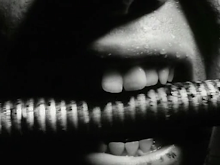
One thing that makes "Doomsday" an interesting entry into the neo-post-apocalyptic genre is its blatant recognition of the "Mad Max" era the movement owes itself to. Unlike the gritty realism of the "28 Days Later" movies and the "Private Ryan"-indebted "Children of Men," "Doomsday" takes the ultra-seriousness of its own kind and reaches back to the Eighties to create a sense of comedic contrast. Not that the film is exhilarating or side-splittingly funny, but it finds a new voice for familiar material and manages to be cheaply amusing from beginning to end.
The film starts with a Malcom McDowell voice over that tells us of a wicked virus that has isolated Glasgow and other parts of Scotland. A large wall is built around the area to quarantine the virus and annhialate the infected people. In London, order is barely maintained from a series of Orwellian lies being fed to the media. Here, we meet sexy English police officer Catherine Sinclair (Rhona Mitra) and her government-affiliated ally Bill (Bob Hoskins). Bill is told about a community of survivors beyond the wall including a power-hungry scientist Kane (McDowell) who might hold the cure. Little do they know of a band of rebels, who are spiky-haired, cannibalistic savages with a taste for S&M chic. Sinclair is sent with a few fortune soldiers on a suicide mission to find the cure and somehow make it back to the wall alive.
The video game-like plot itself is really nothing special. The zombie lore of microvirus holocausts proved itself tired beyond belief in "28 Weeks Later," and post-apocalyptic imagery in general is starting to become banal. However, Neil Marshall seemed to keep himself inspired throughout the production - even as he pretty much recreated scenes and tones from other movies and hoped to bind the film with his own flourishes of originality. He is occasionally successful of this hope, giving the movie moments of shocking bravado when you think it's taking a turn for generic. My favorite scene is a communal blood feast seemingly inspired by the flesh fare in "A.I.," where eighties New Wave music is played over a spectacle of brutality. The scene serves as the film's dynamic centerpiece, allowing the retrogressive style to completely unfold and the movie takes self-indulgent pleasure in its grab bag of influences. The grace of Neil Marshall in that scene, and in the movie as a whole, is that he allows the audience to have as much fun in watching as he obviously did making it.
In the third act, Kane is finally revealed in a tribute to the great revelation of Colonel Kurtz in "Apocalypse Now." His megalomania is established in a familiar monlogue, and the scene carries on with a "Gladiator"-like fight sequence which throws in the sword and sandle epic to the many hats the film tries on. It all feels a bit underwhelming at this point, and Malcom McDowell's latter years status as a B-movie icon seems all the more appropriate. The conclusion shifts back to "Mad Max" mode with an old school car chase and by the end, it definitely feels like a tad too much. Then again, that is precisely the film's unique charm is its celebration of the sci-fi/fantasy days of old that have been all but forgotten in this ultra-serious age. A lot of critics complained that "Doomsday" was laughable in comparison to Marshall's previous breakthrough hit "The Descent." Yes, of course it is. And that's why it's more fun.
